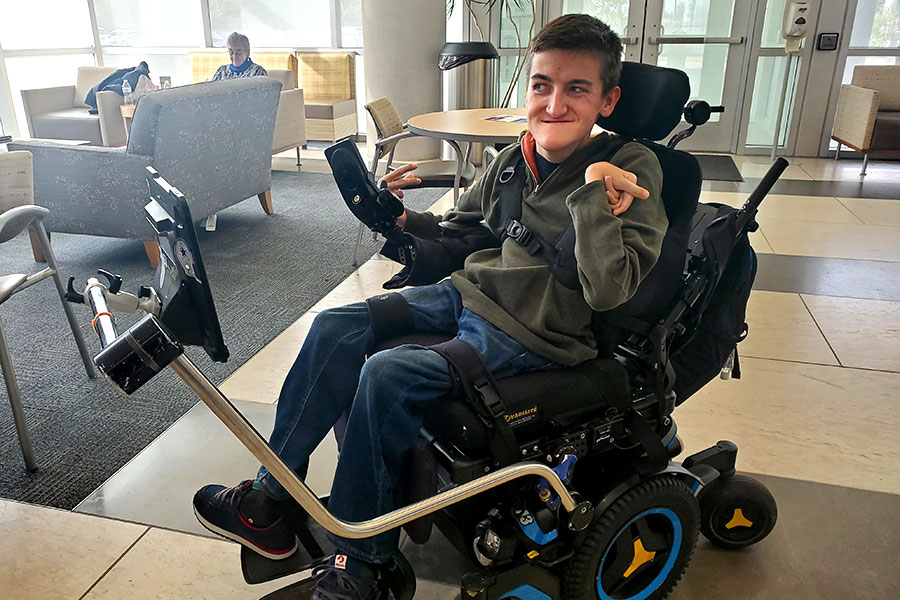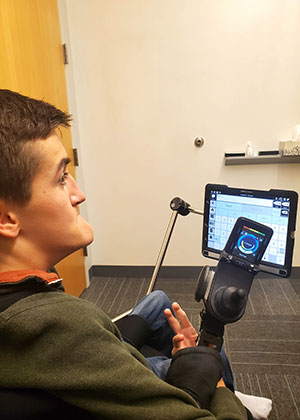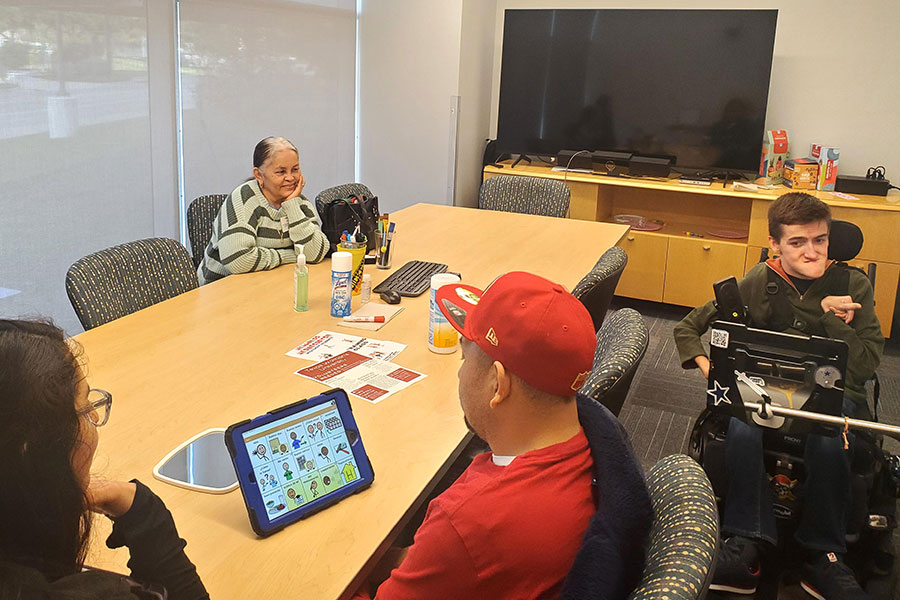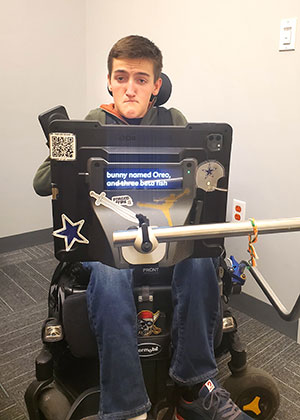Stroke Center’s new ambassador has disarming demeanor

Dec. 4, 2023 – DENTON – Although he’s confined to a wheelchair, Watson Polk’s dream job is to be on the Mercedes Benz Formula 1 Racing Team. If that doesn’t work out, he is doing just fine inspiring clients at the Stroke Center on the Dallas campus of Texas Woman’s University.
The 20-year-old race-car fan has become an ambassador and a little bit of a celebrity at the Stroke Center, which provides outpatient treatment and research programs to help the rehabilitation of stroke and traumatic brain injury patients as well as hands-on training for TWU graduate students.
Polk has a metabolic disorder called Glutaric Acidemia type 1, GA1 for short. A metabolic crisis at five months old caused him to lose his motor skills, such as walking, speaking and the use of his hands.
Polk uses a type of Augmentative and Alternative Communication device called eye-gaze technology to communicate. He volunteered on Wednesdays during the fall semester, helping Stroke Center clients communicate with their own AAC devices, which are often apps loaded onto tablets.
He is showing individuals that everyone can have a voice, even if it’s not a traditional one. And it won’t stop their personalities from shining through. Polk’s certainly does.

“AAC gave voice to the things rattling around in my brain,” Polk has said in speeches. “It allows me to text with friends, browse the internet, test my map and flag knowledge and play other games as well. AAC has greatly improved my life, increased my community, and given me more opportunities to share my personality with the world.”
After Polk spoke to The Stroke Center’s director and professor Jyutika Mehta’s speech-language pathology graduate classes in September, Mehta realized she had the answer to one of her problems right in front of her. The Stroke Center clients were getting frustrated with their AAC devices, and Mehta was searching for a way to motivate them.
“Dr. Mehta has been one of my biggest supporters and has also been helping me by giving me speaking opportunities,” Polk said. “She and I have a lot of the same ambitions. We like to promote AAC for speech therapy patients who need help to communicate. When she offered me the job at the Stroke Center, I jumped at the chance to help speech therapy students and clients.”
Mehta was looking for someone proficient with an AAC device to communicate with her clients on their AAC devices. Some of the older clients were also hesitant about using the technology at all. It takes practice to swipe through various screens and folders on the tablet and can be overwhelming, especially for individuals who are having to relearn language and also learn something new at the same time.

“For some clients, oral speech is not going to be a possibility,” Mehta said. “The AAC devices would be their primary means of communication and we want them to be very proficient. In some instances when oral speech is not adequate, the AAC can supplement the times when they are having difficulty with oral speech. I am always very concerned about emergency situations and potential communication difficulties that may arise.”
For the last 10 years, Polk has used an AAC device that uses eye-gaze technology, which allows a user to control a computer or tablet by looking at letters or words on a computer screen. People can read on the back of his tablet screen what Polk is communicating and they will also hear a synthesized voice.
Polk isn’t just proficient with the AAC; he is more of a super user. Having to complete all his school assignments with his AAC device likely contributed to his prowess. Imagine having to write long essays for high school English with your eyes, letter by letter. Polk, who graduated from Aubrey High School in 2021, solved calculus problems on his device. What took his classmates five or 10 minutes with their pencils took him 30 to 40 minutes.
“I realized that I could help as soon as I saw other Stroke Center clients having trouble with communication,” Polk said. “In my first session with one of the clients, I learned he was a Vietnam veteran. So I said, ‘Thank you for your military service!’ and asked, ‘Which branch did you serve in?’”
When an SLP graduate student, overseen by the department faculty (who are licensed speech-language pathologists), is working with a client, Polk serves an integral role. He uses his AAC device to converse with the client, who, in turn, uses his device to communicate back. Polk also suggests screens or folders that a client should navigate to. The graduate student is the facilitator, stepping in to help the client when needed.

Mehta and her staff have often had to tell Polk to slow down because he can communicate so proficiently with his own device. He is also quick with his power wheelchair. It could be that Polk may be channeling his favorite F1 driver, Lewis Hamilton, when he zips down the Stroke Center hallways and maneuvers around tight corridors and through small rooms.
Since he has to type with his eyes, letter by letter, Polk has saved a lot of pre-programmed words, phrases and sentences on his AAC device so he can select those quickly when certain subjects come up in conversation. When asked if he watched the latest F1 race, he will quickly respond with: “Do you even know who I am?”
“Watson has never met a stranger,” Mehta said. “Watson is Watson. His personality comes through. He drives right up to you. ‘Hey, I’m Watson,’ and he will strike up a conversation. I am hard pressed to find an individual who will not respond to Watson. He cracks up everyone. He has all these jokes and one liners.”
If you talk to Polk, he will probably tell you one of his jokes.
“Have you heard my pepper joke? What does a nosey pepper do? It gets hala-peen-yo business.”
“Clients who are using AAC devices are seeing someone being very successful and that is now the goal they are aiming for,” Mehta said. “It’s very different when you see someone like Watson using the system and seeing how good the communication can be. It has made a big difference in their overall attitude and the way they are engaging with us now.”
Mehta plans on having Polk be a paid employee in the spring.
Media Contact
Amy Ruggini
Digital Content Manager
940-898-3628
aruggini@twu.edu
Page last updated 11:38 AM, May 30, 2024